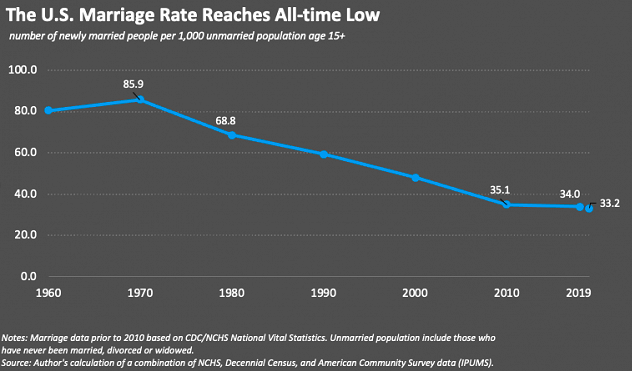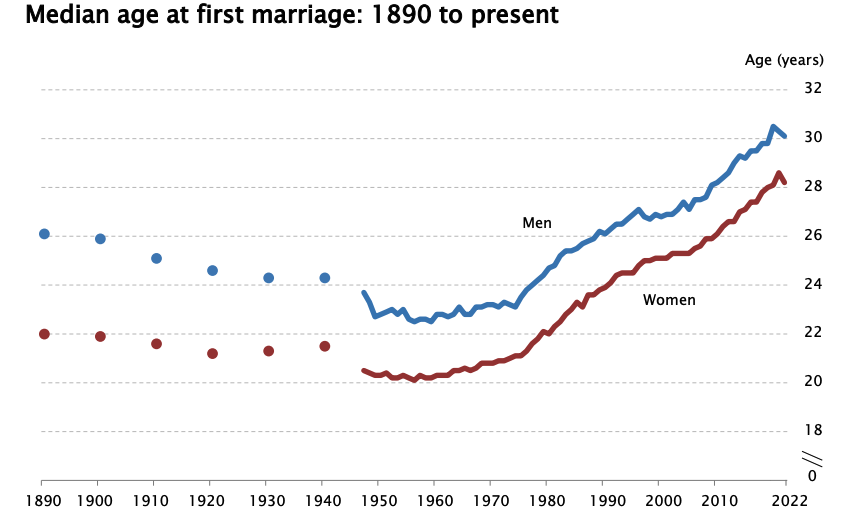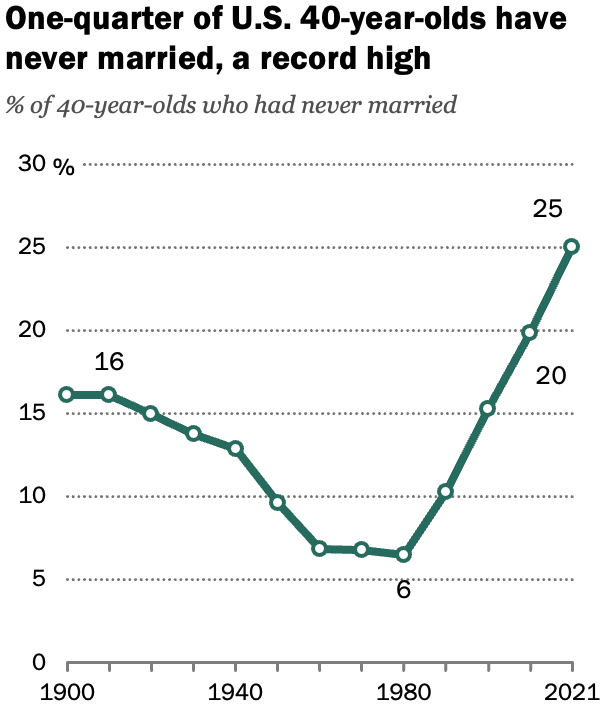Two in five (40%) of young adults say marriage as an institution has “outlived its usefulness,” a recent poll found.
Though many young adults may believe this, nothing could be farther from the truth. In many respects, marriage is more important – especially for children – than it has ever been before.
The Decline of Marriage
It’s a well-known fact that marriage has been declining for decades.
The U.S. marriage rate hit an all-time low in 2019.
According to the Institute for Family Studies, for every 1,000 unmarried adults in 2019, only 33 got married. In 2010, that number was 35. It was more than double that in 1980 when 69 adults per 1,000 got married, and even higher in 1970 following the post-WWII “marriage boom,” when the number was 86.

Photo Credit: Institute for Family Studies
Today, not only are fewer people getting married, but those who do are marrying later.
According to the U.S. Census Bureau, the average age of marriage is higher than it has ever been. The median age at first marriage is now 30 for men, and 28 for women.
These numbers have risen steadily since 1970 when men married at 23, on average, and women married at 21.

Photo Credit: U.S. Census Bureau
In addition, a record number of 40-year-olds in the U.S. have never been married – a staggering 25% as of 2021, compared to 20% in 2010 and just 6% in 1980.

Photo Credit: Pew Research Center
The decline of marriage has not been good for individuals – or society at large – because marriage provides couples, and their children, with extraordinary benefits.
The Benefits of Marriage for Couples
Though several popular “influencers” may assert otherwise, the research is crystal clear: marriage remains good for men and for women. Marriage provides couples with great health, wealth, mental and social benefits.
Men who are married:
- Live nearly 10 years longer than their unmarried peers;
- Are less likely than singles to suffer from long-term chronic illnesses or disabilities;
- Drink about half as much as their unmarried peers of the same age;
- Make significantly more money than bachelors;
- Report less depression, less anxiety and lower levels of other psychological distress than singles;
- Are about three times less likely to commit suicide than the unmarried.
Women who marry experience many advantages, too.
- Married women have a 50% lower mortality rate than their nonmarried peers.
- Being unmarried shortens a woman’s life span by more years than would being married and having cancer or living in poverty.
- Single women are far more likely to experience violence by men than are married women.
- Married women have far higher household incomes than single, divorced or widowed women.
- Marriage provides women with access to private health insurance; 83% of married women have private health insurance compared to just over half of divorced or never-married women.
And for both men and women, marriage provides them with the greatest “happiness” benefit compared to any other factor, including age, race, sex or educational status.
As the Daily Citizen has previously reported,
Forty percent of married mothers with children report being “very happy” compared to married women without children (25%), single childless women (22%) and unmarried women with children (17%).
Thirty-five percent of married men with children report being “very happy” compared to married men without children (30%), unmarried men with no children (14%) and unmarried men with children (12%).
As Linda Waite and Maggie Gallagher summarize in their book The Case for Marriage, “In most areas of life, marriage makes both men and women better off.”
The Benefits of Marriage for Children
Marriage doesn’t just benefit the couples who get married, it also benefits any children they have.
A recent report from the Institute for Family Studies (IFS) shows that, as Brad Wilcox notes, “Kids benefit even more today from two parents than they did 16 to 40 years ago.”
Children from intact homes are more than twice as likely to graduate from college (40%) compared to those from non-intact families (17%).
Additionally, “Almost four-in-ten Millennials (42%) from intact families are affluent by the time they are in their mid-thirties, compared with 24% of their peers from non-intact families.”
IFS notes,
The upshot for children is that marriage not only still matters, but it seems to matter more than ever. Children who have the benefit of two parents are comparatively more advantaged today than they were in previous decades.
Conclusion
Marriage has been on the decline, but as an institution, its is just as important as it always has been for the wellbeing of couples, children and society – if not more so.
So no, young adults, marriage has not “outlived its usefulness.” As a divine institution, marriage will never be outdated or obsolete. It is a part of God’s very design for humanity and for human relationships.
It always has been. And this side of eternity, it always will be.
Focus on the Family is presenting the upcoming two-day Resist the Drift Marriage Conference in Anaheim, CA from November 3-4. Attending couples will receive Bible-based concepts and tools from our trained marriage professionals on how to reconnect and strengthen their marriages. You can learn more about the upcoming conference here.
Also, if your marriage is struggling, Focus on the Family offers Hope Restored Marriage Intensives. Hope Restored is a biblically based, Christian counseling experience for couples facing a crisis moment in their marriage or suffering from years of disconnection and relationship decay. You can find out more about Hope Restored here.
Related articles and resources:
Counseling Consultation & Referrals
Don’t Believe the Modern Myth. Marriage Remains Good for Men.
Don’t Believe the Modern Myth. Marriage Remains Good for Women.
Why Marriage Matters for Adults
New Research Shows Married Families Matter More Than Ever
Married Mothers and Fathers Are Happiest According to Gold-Standard General Social Survey
The Case for Marriage: Why Viral TikTok of 29-Year-Old Single Woman is Problematic
Focus on the Family: Marriage Assessment
Focus on the Family: Marriage Enrichment Events
Photo from Shutterstock.






